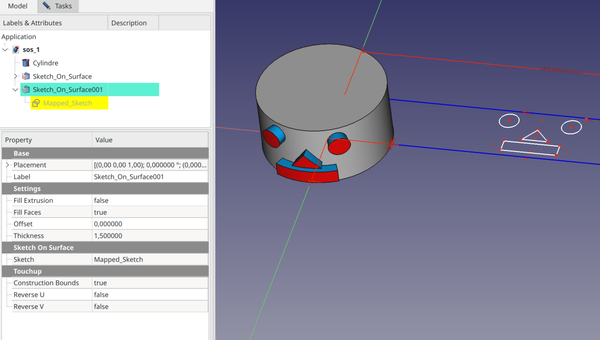Curves SketchOnSurface: Difference between revisions
(Usage...) |
(Usage...) |
||
| Line 51: | Line 51: | ||
## A "Sketch on surface" object appears in the [[Tree_view|Tree view]]. |
## A "Sketch on surface" object appears in the [[Tree_view|Tree view]]. |
||
## Expand this object to make "Mapped sketch" appear below. |
## Expand this object to make "Mapped sketch" appear below. |
||
## Click on the space bar to make "Mapped sketch" visible. With a double click on "Mapped sketch", a blue frame appears. The given dimensions of the blue frame are corresponding to the surface of the object on which you want to map your sketch. The sketch will be placed perpendicular to the surface to be covered. |
|||
## Draw a SketchOnSurface object on this sketch, the blue frame, like a usual sketch and constrain it 100% (recommended). |
|||
## Exit edit mode. |
|||
| ⚫ | |||
## Edit the sketch and add geometries inside the blue construction bounds. |
## Edit the sketch and add geometries inside the blue construction bounds. |
||
| ⚫ | |||
==Options== <!--T:15--> |
==Options== <!--T:15--> |
||
Revision as of 18:17, 3 April 2022
This documentation is not finished. Please help and contribute documentation.
GuiCommand model explains how commands should be documented. Browse Category:UnfinishedDocu to see more incomplete pages like this one. See Category:Command Reference for all commands.
See WikiPages to learn about editing the wiki pages, and go to Help FreeCAD to learn about other ways in which you can contribute.
|
|
| Menu location |
|---|
| Surfaces → Sketch on Surface |
| Workbenches |
| Curves |
| Default shortcut |
| None |
| Introduced in version |
| - |
| See also |
| None |
Description
This tool maps a sketch onto a face, like a label on a bottle.
The sketch must be actually attached to a face (see Sketch.Support).
The Map mode of the sketch has no effect on the result.
Above: shows the Sketch_on_surface object applied to the cylinder face (left) and the source sketch in edit mode (right)
Usage
- Switch to the
Curves workbench (install from
Addon Manager is necessary, if not previously installed)
- There are 2 methods to use the SketchOnSurface tool:
- You already have a sketch that you want to map on a face
- Attach the sketch to the target face.
- Edit the sketch and add a Construction (blue) rectangle around the geometries. This rectangle will be the parametric bounds of the face.
- Exit edit mode.
- Select the sketch.
- Activate SketchOnSurface by either:
- You have no sketch to map yet
- Select the target face in the 3D view
- Activate SketchOnSurface by either:
- A "Sketch on surface" object appears in the Tree view.
- Expand this object to make "Mapped sketch" appear below.
- Edit the sketch and add geometries inside the blue construction bounds.
- A SketchOnSurface object will be created on the surface of your object based on this sketch.
Options
- Fill Extrusion: When the Thickness value is not null, this will generate lofting faces (the blue faces in the above screenshot).
- Fill Faces: This will fill all the geometrical figures closed in faces (the red faces in the above screenshot).
- Offset: This will push the shapes mapped above into the target face. Do not put an offset greater than the thickness, it makes the face disappear on the inside.
- Thickness: If not null, this will give thickness to the surfaces created above.
Properties
Limitations
The blue construction lines of the sketch are part of the sketch even if they are not visible when the sketch is closed and even if the blue lines exceed the blue construction frame. The complete sketch will automatically scale so that it is no larger than the area to be covered.
This also means, internal geometry of complex curves (Bezier, Ellipse), despite being invisible, will be counted towards the bounding box of the sketch, which might cause the final mapping to appear smaller than the actual surface.
Scripting
- Curves IsoCurve, Curves JoinCurve, Curves ParametricComb, Curves ParametricSolid, .................
- Getting started
- Installation: Download, Windows, Linux, Mac, Additional components, Docker, AppImage, Ubuntu Snap
- Basics: About FreeCAD, Interface, Mouse navigation, Selection methods, Object name, Preferences, Workbenches, Document structure, Properties, Help FreeCAD, Donate
- Help: Tutorials, Video tutorials
- Workbenches: Std Base, Arch, Assembly, CAM, Draft, FEM, Inspection, Mesh, OpenSCAD, Part, PartDesign, Points, Reverse Engineering, Robot, Sketcher, Spreadsheet, Surface, TechDraw, Test Framework
- Hubs: User hub, Power users hub, Developer hub
